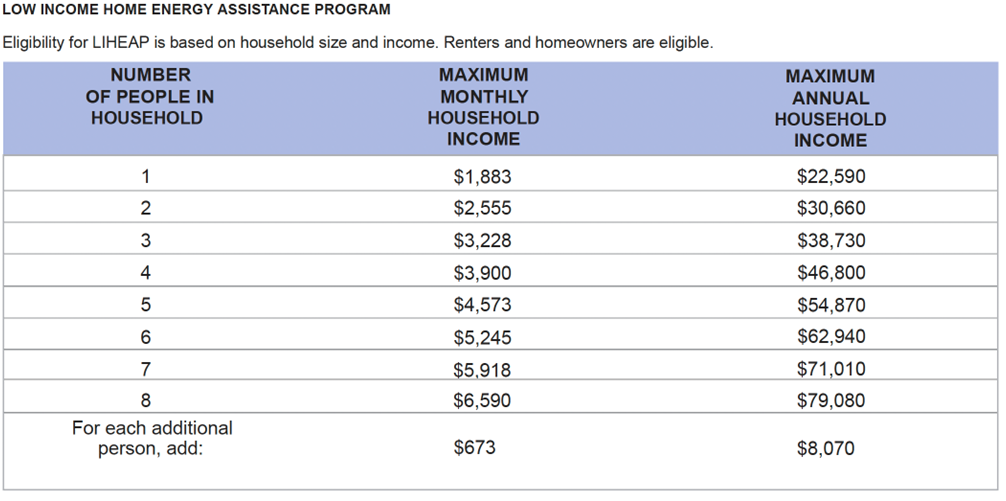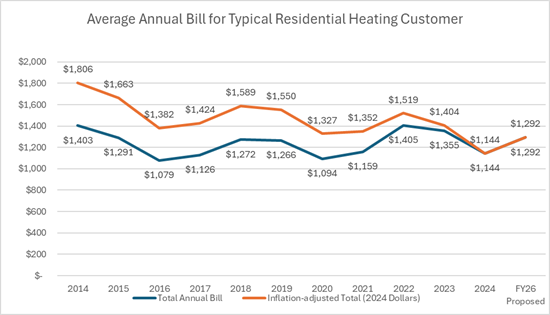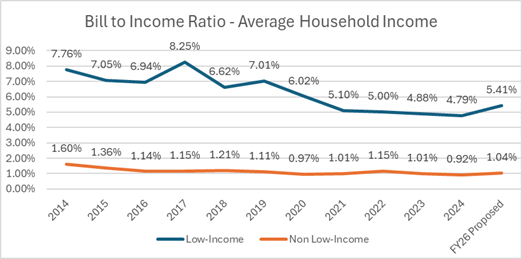
There is more time for PGW customers to apply for a grant of up to $1,000 toward their winter heating bills. The application period for a Low-Income Home Energy Assistance Program (LIHEAP) grant has been extended to April 18, 2025.
PHILADELPHIA (March 25, 2025) – Philadelphia Gas Works (PGW) is letting families, students, Philadelphia renters and homeowners know that the deadline to apply for the Low-Income Home Energy Assistance Program (LIHEAP) has been extended to April 18, 2025. Qualified LIHEAP applicants could receive up to $1,000 in free money for their PGW natural gas bills. If a customer’s service has been terminated, or is in danger of termination, they could receive up to an additional $1,000 via LIHEAP’s Crisis program.
Since the grant period opened in November, PGW has successfully processed more than 32,000 LIHEAP applications with more than $8 million awarded to its customers to date. LIHEAP grants do not have to be repaid.
Here are four easy ways to apply for LIHEAP:
Applicants must have a household income at or below 150 percent of the Federal Poverty Level to meet LIHEAP eligibility requirements. Eligibility guidelines are listed below and available here.

“All of our customers deserve access to affordable, safe, and reliable natural gas service without compromising their basic needs. Many Philadelphians are eligible for this money, that is free – don’t leave money on the table this winter,” said Denise Adamucci, Senior Vice President, Customer and Regulatory Affairs at PGW. “We are committed to easing the financial energy burden on hardworking Philadelphians. Please share this valuable information with family, friends, and neighbors who may benefit from the LIHEAP grant as we experience the cold of winter,” added Adamucci.
Customers enrolled in PGW’s Customer Responsibility Program (CRP) can also apply for LIHEAP for even more assistance with heating bills. Prefer to apply in person or learn more about your eligibility for LIHEAP? Customers can visit any Neighborhood Energy Center across Philadelphia for help with applying for LIHEAP or learning about other heating assistance programs.
(Philadelphia, PA – March 17, 2025) – Philadelphia Gas Works (PGW) issued a Request for Proposals (RFP) for a firm to conduct a geothermal site survey and feasibility study in conjunction with the School District of Philadelphia (SDP). The study will assess the feasibility of implementing a closed-loop geothermal system capable of supporting multiple heat pumps for heating and cooling. The exploration of geothermal technology is part of PGW’s diversification efforts, which aim to grow revenue and deliver increased value to its customers while expanding on its clean energy portfolio and lowering emissions. The process will also assist PGW in evaluating what role PGW can play in delivering innovative energy services in addition to natural gas in the future.
“Launching a feasibility study for geothermal in collaboration with the School District of Philadelphia is a critical step in the near term to identify strategies to help diversify the revenue of PGW, sustain jobs, reduce emissions, and offer customers a variety of cost-saving energy efficiency options,” said Seth Shapiro, PGW President and Chief Executive Officer. “This kind of partnership is key in keeping PGW financially strong for its customers in the long term, while also delivering on Mayor Parker’s clean and green vision by improving quality of life for Philadelphians.”
By partnering with the SDP, PGW supports the district’s GreenFutures Plan to provide students and staff with a well-resourced, safe, healthy, clean, and comfortable learning and working environment. PGW and SDP selected the John F. McCloskey Elementary School (8500 Pickering Ave, Philadelphia, PA 19150) and the adjacent Dorothy Emanuel Recreation Center (8500 Provident Rd, Philadelphia, PA 19150) as the site for the selected proposer to evaluate the networked energy needs and system requirements for a geothermal system. The study will consider factors such as geological conditions, available space for underground bore installations, and the potential design for a decentralized geothermal unit with pumping capabilities.
“By partnering with Philadelphia Gas Works to explore innovative energy solutions within our schools, we aim to provide clean and efficient heating and cooling options, enhance our school environment, reduce costs, and be part of a key initiative that helps pave the way for equitable, sustainable energy strategies that benefit all Philadelphians,” said Deputy Superintendent of Operations Oz Hill, School District of Philadelphia.
“There is no silver bullet to meet a clean energy vision; it will take a multifaceted approach. We greatly appreciate the careful planning and due diligence taken by everyone involved to date to get us to this point including feedback from key stakeholders and the public,” said Shapiro. “We value our customers and take seriously our responsibility to pursue innovation that benefits their safety and affordability and helps lay the foundation for the future.”
Interested parties must submit their proposals by 2:00 p.m., April 15, 2025. For more information, please visit this link. Questions relating to the Request for Proposals should be directed in writing to PGW via pgw.procureware.com. Interested vendors may not contact PGW personnel regarding this RFP other than through pgw.procureware.com.
This latest activity adds to PGW’s most recent energy innovation initiatives:
The rate request will address the energy burden of those vulnerable to poverty, further safety investments, and meet the City’s carbon reduction goals
(Philadelphia, Pa – February 27, 2025) – Philadelphia Gas Works (PGW) announced today that it has filed a base rate case with the Pennsylvania Public Utility Commission (PUC). PGW has not filed for a rate adjustment in two years. The current filing requests permission to increase rates by $105 million annually to build upon the company’s effectiveness in delivering safe, reliable, sustainable natural gas service; and introduces new, innovative programs to encourage energy efficiency and to support those vulnerable to poverty in a meaningful way.
In PGW's last rate case in 2023, the PUC approved $468 million in revenue. For 2026, PGW is asking for $523 million in revenue; that $55 million difference compared to 2023 is to cover the rising costs of inflation, wage and health insurance increases and capital improvements over the last two years – which results in a $105 million base rate increase for customers.
While the cost of delivering service to 500,000 customers has gone up in the near term; the low price of natural gas and PGW’s targeted energy conservation efforts have ushered in significant cost savings for PGW customers over the last ten years.
PGW is the largest municipally owned gas utility in the country serving the highest proportion of Pennsylvania customers whose incomes are below the federal poverty threshold, this current rate proposal seeks to continue supporting the conservation actions of its half a million customers and offering newer pathways to billing stability, enhanced services, and potentially fewer rate increases moving forward. Highlights of the rate filing proposal include:
Unlike investor-owned utilities, PGW does not make a profit. The company has no shareholders and there is not a rate of return included in PGW’s rates. In preparation for its filing, the company conducted an affordability analysis to assess the extent to which energy bills may pose a challenge for some customers. Some of the conclusions drawn from the analysis by PGW are:

“PGW’s base rate request is intended to protect the safety and well-being of our customers, their wallets, and Philadelphia’s quality of life. PGW does not make a profit as a city-owned utility. Every dollar collected is directly allocated to ensure the safe and reliable delivery of low-cost energy service to our customers – throughout every ZIP code in Philadelphia,” said Seth Shapiro, PGW’s President & CEO.
“The reality for customers today is that natural gas remains the most affordable energy option available on the market for Philadelphia’s residential families to heat their homes, do their laundry, and feed their families. We appreciate our customers’ trust in PGW to work responsibly on their behalf in our latest rate filing request. We care deeply about protecting our customer’s interests.”
If the company’s entire request is approved, the bill for a residential customer using 61 thousand cubic feet (Mcf) of natural gas per year would increase from $92.60 to $104.61 per month, or by 13%.
The trends of PGW’s bill to income (BTI) have steadily decreased over time, with proposed rates still showing lower BTI ratios for both low-income and non-low-income customers (shown below).

PGW’s natural gas rates are made up of two main components: a delivery charge (or base rate) and a commodity charge (gas cost). The base rate reflects the cost of delivering natural gas to the customer’s residence, distribution system maintenance and customer billing costs. The gas cost is what PGW pays for natural gas and is passed on to the customer without markup.
PGW is ranked amongst the best in the industry in helping its customers lower the costs of their energy bills, according to JD Power *. And natural gas remains the most affordable way to heat a home compared to other sources like electric or home heating oil.
In recent years, PGW has launched several initiatives to do more with less, carefully control PGW’s expenses, and manage the costs of rate increases, including:
For questions, individuals and entities can contact the PUC at 1-800-692-7380 and leave their name and address to be notified of any public input hearings that may be scheduled related to this case.
*Source: 2024 Gas Utility Residential Customer Satisfaction Study
Page 4 of 79 pages.